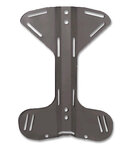eelnoraa
Contributor
Logically, cost/benefit ratio is the main reason Ti plate doesn't make sense. Think what is Ti's benefit? Strength vs weight ratio, we know we don't need the strength because kydex work just fine. Corrosion resisit, we also we don't need it because Al and SS are just fine. For look, Ti is just a gray metal. At least in my brief experience, it get scratched very easily, easier than SS for sure, maybe even easier than hard anodized Al. While Ti plate will look nice and shiny new, in no time, it will have full fine stretch and become dull.
For diver who need ballast, Ti is a poorer choice than SS because of the lower density. In water, the "weight" of the material (assuming it sinks) is reduced by this factor: (material density - water density)/material density. You want very high material density, so the reduction is small. I would think if anything else, a tungsten plate would make the most sense. But tungsten is probably the most difficult metal to work with. It is extremely hard, has highest melting point of all metal, and it brittle.
From diver who don't need ballast or need weight reduction, I really don't see how Ti is better than Kydex.
As for cost, I really don't see how Ti can ever be at the same level as SS or Al simply because Ti is rare compared to Al and iron. And it is definitely a lot harder to work with.
Now with the logical stuff out of the way, I honestly don't mind having a Ti plate if it is affordable just because it is kind of cool. I can go tell other I have a Ti plate. But it is not about making logical sense, much like having Ti regulators.
For diver who need ballast, Ti is a poorer choice than SS because of the lower density. In water, the "weight" of the material (assuming it sinks) is reduced by this factor: (material density - water density)/material density. You want very high material density, so the reduction is small. I would think if anything else, a tungsten plate would make the most sense. But tungsten is probably the most difficult metal to work with. It is extremely hard, has highest melting point of all metal, and it brittle.
From diver who don't need ballast or need weight reduction, I really don't see how Ti is better than Kydex.
As for cost, I really don't see how Ti can ever be at the same level as SS or Al simply because Ti is rare compared to Al and iron. And it is definitely a lot harder to work with.
Now with the logical stuff out of the way, I honestly don't mind having a Ti plate if it is affordable just because it is kind of cool. I can go tell other I have a Ti plate. But it is not about making logical sense, much like having Ti regulators.





